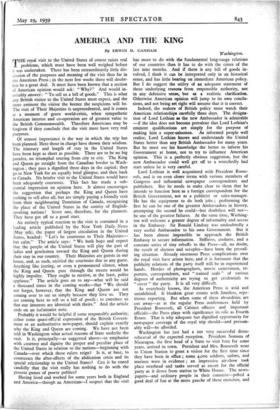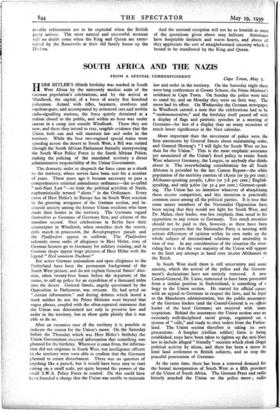AMERICA AND THE KING
By ERWIN D. CANHAM
THE royal visit to the United States of course raises real problems, which must have been well weighed before it was undertaken. There has been extraordinarily little dis- cussion of the purposes and meaning of the visit thus far in the American Press ; in the next few weeks there will doubt- less be a great deal. It must have been known that a section of American opinion would ask: "Why?" And would in- evitably answer: "To sell us a bill of goods." This is what any British visitor to the United States must expect, and the more eminent the visitor the keener the suspicions will be. The visit of Their Majesties is unprecedented, and it comes at a moment of grave world-crisis, when sympathetic American interest and co-operation are of greatest value to the British Commonwealth. Therefore Americans may be forgiven if they conclude that the visit must have very real purposes.
Of utmost importance is the way in which the trip has been planned. Here those in charge have shown their wisdom. The itinerary and length of stay in the United States have been kept as short as possible. There are to be no big parades, no triumphal touring from city to city. The King and Queen go straight from the Canadian border to Wash- ington; they pass a dignified three days in the capital; they go to New York for an equally brief glimpse, and then back to Canada. No briefer visit to the United States would have been adequately courteous. This fact has made a sub- stantial impression on .opinion here. It almost encourages the suggestion that perhaps the King and Queen have nothing to sell after all, but are simply paying a friendly visit from their neighbouring Dominion of Canada, recognising the place of the United States in the comity of English- speaking nations! Score one, therefore, for the planners. They have got off to a good start.
An entirely typical reaction to the visit is contained in a leading article published by the New York Daily News (May 9th), the paper of largest circulation in the United States, headed: "Let's be courteous to Their Majesties— but calm." The article says : "We both hope and expect that the people of the United States will play the part of ladies and gentlemen toward the King and Queen during their stay in our country. Their Majesties are guests in our house, and, as such, entitled the courtesies due to any guest. Anything like jeering, or even a pronounced silence, when the King and Queen pass through the streets would be highly impolite. They ought to receive, at the least, polite applause." The article goes on to say—what will be said a thousand times in the coming weeks—that "We should not forget, however, that the King and Queen are not coming over to see us simply because they love us. They are coming here to sell us a bill of goods ; to convince us that our interests are identical with theirs." And the article ends on an isolationist note.
Probably it would be helpful if some responsible authority, either some quasi-official expression of the British Govern- ment or an authoritative newspaper, should explain exactly why the King and Queen are coming. We have not been told in Washington what actual reasons of State underlie the visit. Is it, principally—as suggested above—to emphasise with courtesy and dignity the proper and peculiar place of the United States in relation to the nations—beginning with Canada—over which these rulers reign? Is it, at base, to counteract the after-effects of the abdication crisis and its special relationship to the United States? Can it be stated candidly that the visit really has nothing to do with the present games of power politics?
Having lived and worked for some years both in England and America—though an American—I suspect that the visit Washington. has more to do with the fundamental long-range relations of our countries than it has to do with the crises of the last nine months. And if there is any bill of goods in- volved, I think it can be interpreted only in an historical sense, and has little bearing on immediate American policy. But I do suggest the utility of an adequate statement of these underlying reasons from responsible authority, not in any defensive sense, but as a realistic clarification. Otherwise American opinion will jump to its own conclu- sions, and not being set right will assume that it is correct.
Indeed, the makers of British policy must watch their American relationships carefully these days. The designa- tion of Lord Lothian as the new Ambassador is admirable —if the idea does not become prevalent that Lord Lothian's eminent qualifications are simply for the purpose of making him a super-salesman. As informed people well realise, Lord Lothian knows and understands the United States better than any British Ambassador for many years. But he must use his knowledge the better to inform his Government at home, not to try to influence American opinion. This is a perfectly obvious suggestion, but the new Ambassador could well get off to a wretchedly bad start unless he is very careful.
Lord Lothian is well acquainted with President Roose- velt, and is on even closer terms with various members of Congress and influential newspaper correspondents and publishers. But he needs to make clear to them that he intends to function here as a foreign correspondent for the British Government, not as a publicist or sales-manager. He has the equipment to do both jobs ; performing the first he can be one of the greatest Ambassadors in history, attempting the second he could—but doubtless will not— be one of the greatest failures. At the same time, Washing- ton will welcome a greater degree of informality and access in the Embassy. Sir Ronald Lindsay was undoubtedly a very useful Ambassador to his own Government. But it has been almost impossible to approach the British Embassy to secure information. Stiffness, coolness, and a constant series of tiny rebuffs to the Press—all, no doubt, the result of shyness and scruples—have been the prevail- ing situation. Already enormous Press complications over the royal visit have arisen here, and it is fortunate that the publicity relations of the party itself will be in experienced hands. Hordes of photographers, movie cameramen, re- porters, correspondents, and "trained seals" of various degrees of authenticity are trying to get credentials to " cover " the party. It is all very difficult.
As everybody knows, the American Press is avid and uninhibited. It blankets great events with limitless, repe- titious reporting. But when some of these absurdities are cut away—as at the regular Press conferences held by President Roosevelt, all Cabinet officers and important officials—the Press plays with significance its role as Fourth Estate. That is why adequate but dignified cpporrunity for newspaper coverage of the royal trip should—and presum- ably will—be afforded.
Washington has just had a not very successful dress- rehearsal of the expected reception. President Somoza of Nicaragua, the first head of a State to visit here for some years, arrived in town. President and Mrs. Roosevelt went to Union Station to greet a visitor for the first time since they have been in office ; some 4,000 soldiers, sailors, and marines were in evidence ; an impressive air-show took place overhead and tanks served as escort for the official party as it drove from station to White House. The news- papers—and ordinary people in their converse—poked a good deal of fun at the more gauche of these exercises, and notable refinements are to be expected when the British party arrives. The most natural and successful moment will no doubt come when the King and Queen are enter- tained by the Roosevelts at their old family house up the Hudson. And the national reception will not be as boorish as some of the quotations given above may indicate. Americans have hospitable instincts and warm hearts, and above all they appreciate the sort of straightforward sincerity which is bound to be manifested by the King and Queen.



















































 Previous page
Previous page